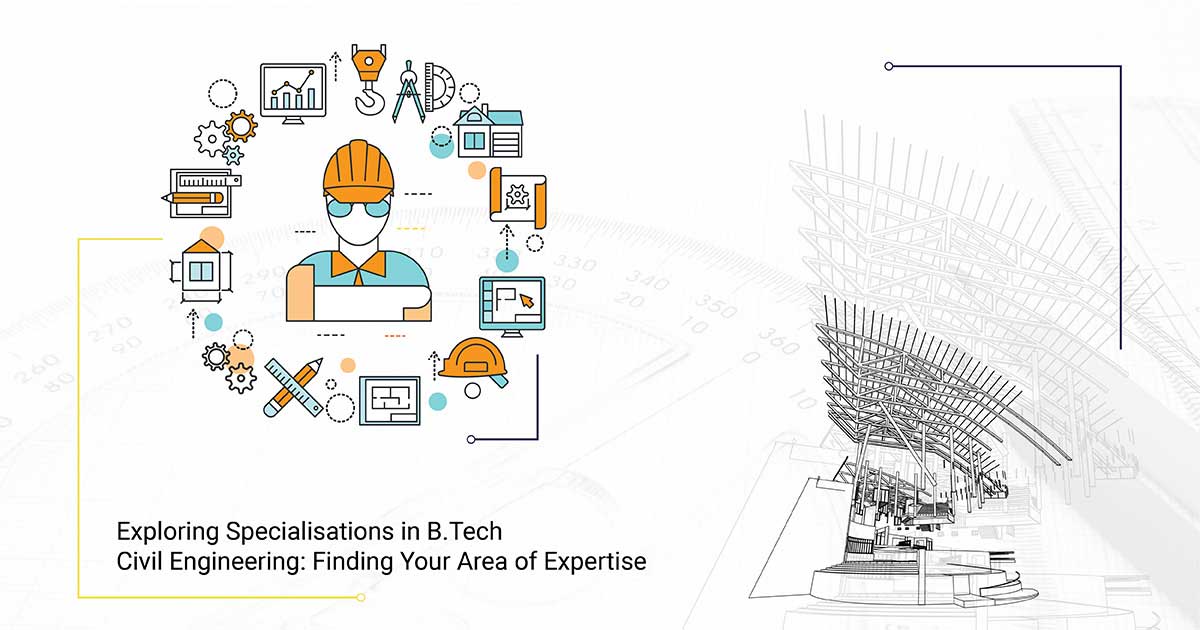FET Blogs


FET Blogs



25 September 2023
Do you know that civil engineering is one of the sought-after professions in India? As India has been investing immensely in infrastructure projects such as roads, bridges, airports, railways, and other forms of development, civil engineers are in high demand to plan, design, and manage these projects. Moreover, due to urbanisation, there has been increased demand for real estate across the country. Besides these, the initiatives taken by the Government of India, such as the "Smart Cities Mission" and the "Atal Mission for Rejuvenation and Urban Transformation (AMRUT)," have increased the demand for civil engineers.
There is immense scope to pursue a career in the field of civil engineering. The first step is to apply for a Bachelor of Technology (B.Tech.) degree in civil engineering. However, there are many specialisations offered under this programme. It is very important for you to choose the right specialisation, as it will determine your career path. We have come up with this guide to help you understand the different specialisations you can pursue in the future!
If you choose structural engineering your curriculum will cover topics such as ways to withstand high winds and natural disasters like floods and earthquakes. You will also study the gravitational features of these buildings to understand how much weight they can handle and develop support mechanisms through beams and columns. Upon graduation, you can pursue further specialisation in bridge design, building, or aircraft engineering. As a structural engineer, you will be capable of undertaking projects such as site inspection, home improvements, skyscraper and vehicle design, and so on.
In this discipline, you will learn how to reduce the overall impact of a man-made system on the natural ecosystem. Moreover, you will also learn to manage natural resources for a construction project. As environmental engineers, you will study the chemical properties of water, soil, and air so that you can design the technical mechanisms that can mitigate pollution issues. After graduating, you can use your knowledge and skills to help organisations improve their sustainability and advise legislators on environmental policies. Upon completing your B.Tech. degree, you can take up projects such as solid waste management, recycling systems, wastewater treatment, drainage systems, crop irrigation, and various others.
Under this specialisation, you will gain knowledge of the design principles of construction, building code regulations, and operation steps for a project. You will also learn how to manage the resources and devices used in a project and develop skills to build safe and sustainable buildings. In this speciality, you will master the art of organising each step of the construction process, such as planning the project, setting a deadline, maintaining inventory, and so on. Upon graduation, you can undertake the projects of constructing residential buildings, commercial buildings, roads and bridges, water treatment plants, and others.
In geotechnical engineering, you will learn about the importance of rocks, soil systems, and artificial materials that support an engineering process. For example, you may be asked to oversee the construction of an underground mining facility. In order to succeed in this role, you will need to learn about the chemical properties of the earth, as different types of rock may require different building techniques. Upon graduation, you can undertake projects such as designing water tank reservoir systems, sewer tunnel systems, pavements and roads, natural embankments, and so on.
In conclusion, there is an increased demand for civil engineers in India. The dynamic landscape of construction and development allows you to explore a plethora of opportunities in the field of civil engineering. However, choosing the right specialisation can determine your career trajectory. While, you will learn to design safe buildings in structural engineering, on the other hand, you will manage ecological preservation in environmental engineering. Therefore, each specialisation serves a vital role in addressing the complex challenges of modern society. Therefore, the field of civil engineering offers a rewarding career if you wish to contribute to the nation's progress and development in a meaningful way.
A1: The best civil engineering specialisation depends on interest, with structural, geotechnical, and environmental engineering being top choices.
A2: Any BTech branch suits civil services, as the exam emphasises general aptitude over specific engineering knowledge.
A3: BTech civil engineering offers a vast scope in construction, infrastructure development, consultancy, and research.
A4: Key civil engineering skills include technical expertise, project management, and effective communication.
Popular Post
17 February 2026
AIE Full Form
10 February 2026
AEIE Full Form
22 January 2026
AE Full Form
16 January 2026
What is Aerospace Engineering?
16 January 2026
What is Chemical Engineering?
Ask an Expert for Free